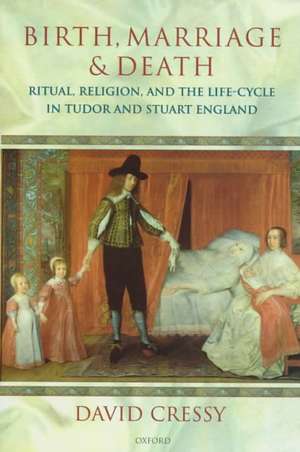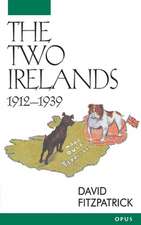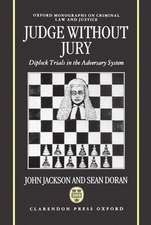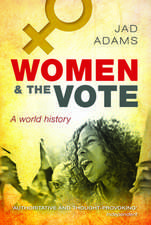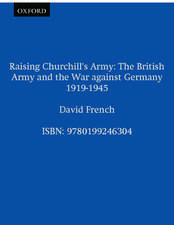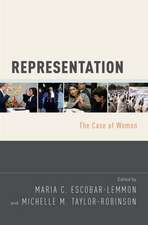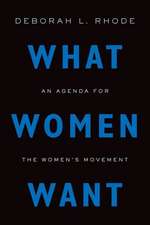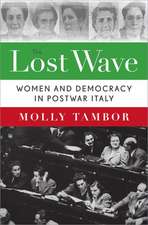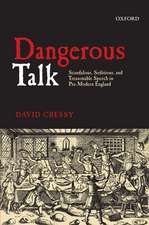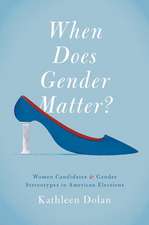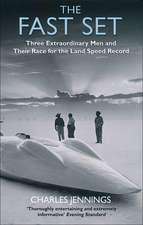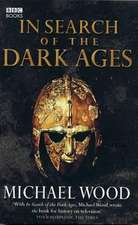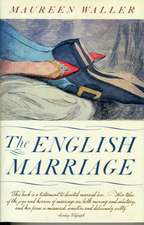Birth, Marriage, and Death: Ritual, Religion, and the Life-Cycle in Tudor and Stuart England
Autor David Cressyen Limba Engleză Hardback – 29 mai 1997
| Toate formatele și edițiile | Preț | Express |
|---|---|---|
| Paperback (1) | 607.07 lei 31-37 zile | |
| OUP OXFORD – 6 mai 1999 | 607.07 lei 31-37 zile | |
| Hardback (1) | 828.68 lei 31-37 zile | |
| OUP OXFORD – 29 mai 1997 | 828.68 lei 31-37 zile |
Preț: 828.68 lei
Preț vechi: 1158.29 lei
-28% Nou
Puncte Express: 1243
Preț estimativ în valută:
158.59€ • 163.83$ • 131.99£
158.59€ • 163.83$ • 131.99£
Carte tipărită la comandă
Livrare economică 15-21 martie
Preluare comenzi: 021 569.72.76
Specificații
ISBN-13: 9780198201687
ISBN-10: 0198201680
Pagini: 658
Ilustrații: halftones
Dimensiuni: 163 x 244 x 40 mm
Greutate: 1.14 kg
Editura: OUP OXFORD
Colecția OUP Oxford
Locul publicării:Oxford, United Kingdom
ISBN-10: 0198201680
Pagini: 658
Ilustrații: halftones
Dimensiuni: 163 x 244 x 40 mm
Greutate: 1.14 kg
Editura: OUP OXFORD
Colecția OUP Oxford
Locul publicării:Oxford, United Kingdom
Recenzii
the volume will remain the essential beginning point for all future study of life-cycle rituals. It is useful for undergraduates and fundamental for all serious students and scholars.
In this richly detailed and beautifully written study, Cressy examines the life-cycle religious rituals against the backdrop of the broader social and cultural tensions transforming England in early modern times ... The work soars in its thorough explanation of each ritual, unique cases, and changing practice over time.
an engaging and scholarly study ... although this book claims to be social history (of which it is a fine example), it is so much more besides. The political, religious, cultural, and intellectual historian will be able to take a great deal away from this book, almost as much as his social colleague.
By taking as his parameters the late-Tudorbethan Reformation period and the aftermath of the glorious revolution, Cressy has provided the context that a lot of social history lacks. And what action-packed context it is!
A good book? Certainly. An edifying read? Without doubt. To be recommended? Highly and enthusiastically.
the great service that Cressy has done us by collecting this material and mapping the ritual of early modern England in such fascinating detail.
Well versed in and eloquent about the theological implications of rituals and the limitations of social theory, Cressy allows neither to distract him from his primary task of describing these rituals in all of their rich diversity. His book is a treasure trove of information about early modern practices ... He is resourceful in finding ways to take his readers into private spaces like the birth room; he is innovative in his chapter on churching ... he is lucid and authoritative on subjects such as 'clandestine marriage' or puritan objections to Prayer Book ritual. Cressy will recount an incident - whether a rowdy funeral or a secret marriage - and then offer several possible interpretations without imposing a single definitive view.
Professor Cressy has woven his marvellous tapestry of the experience of birth, marriage and death in Tudor and Stuart England.
This is a big book on a huge subject ... and all for £25.
There is a fascination, in the detail - rich, raw, well-marshalled, sometimes funny, often poignant.
Ritual will run and run. But David Cressy has brought us a long way already, and written a valuable book.
an extremely valuable work, erudite and enthralling.
His portrayal of life-cycle customs is cinematic in scope and style, a vista of elite protocols, secular traditions, and the contraversies surrounding them illuminated with a profusion of closely focused and vivid anecdotes from everyday life.
an invaluable research companion to Shakespeare studies.
an encyclopedic yet captivating compendium of life-cycle customs ... and their social, cultural, and religious history.
An impressive study.
huge but highly readable volume ... Cressy's interpretations are highly judicious ... this book is a masterly survey and a vast fund of fascinating insight into the conventions governing the world we have lost.
This is a most readable and highly detailed examination of family life in the sixteenth and seventeenth centuries. Taking the life-cycle as its central theme it is essential reading for anyone studying the patterns and rituals of family life in the pre-industrial age. Combining a fascinating exploration of available source materials it is clearly destined to become a classic work on the subject.
imaginative, perceptive, integrated, and beautifully produced ... Written with clarity, elegance and vivacity, it can stand confidently alongside Keith Thomas's equally innovative Religion and the Decline of Magic (1971).
he has given us a blockbuster, which immediately becomes the staple work upon its subject ... a massive compendium of information .,.. It is a book with important ideas but not reliant on them, for its material is so extensive and often so novel in itself that it opens a door on a lost world of experience, dispelling popular myths and removing areas of scholarly ignorance.
detailed and absorbing book ... Cressy finds the same intensity and messy variety in relationships that we know now. In a masterly summary of the ways in which these past people are the same as us and separated from us, he writes that grief 'was both a natural and a cultural phenomenon. It was something people felt, but also something they performed'.
detailed and absorbing book
This is an important book that all English social historians will need to digest. Luckily, given its length, it is digestible. It is packed with fascinating anecdotes, and it is well written ... the results are fascinating and tantilizing ... a book to be read for pleasure and mined for evidence. Anyone working on early modern social history will have to read it and ask him- or herself whether Cressy's positivism had defeated the theorists. In Cressy's world, sweeping generalizations are less important than real life as he understands it.
David Cressy's new book should be essential reading for anyone who wants to understand how the religious rituals associated with birth, marriage and death have managed to survive in the secular climate of late 20th-century Britain, when the habit of regular churchgoing has largely disappeared. Cressy has taken pains to make his book accessible to the common reader. Cressy has a sharp eye for detail, but he also manages to assemble these details into a strong and coherent argument.
a fascinating read in its own right and an invaluable reference aid
should be essential reading for anyone who wants to understand how the religious rituals associated with birth, marriage and death have managed to survive in the secular climate of late 20th-century Britain, when the habit of regular churchgoing has largely disappeared. Cressy has a sharp eye for detail, but he also manages to assemble these details into a strong and coherent argument.
Cressy ... gives us in Birth, Marriage and Death another, even more thoroughly researched work, based upon an astounding number of sources, rich in detail but highly readable.
patchy materials have been tackled by Cressy with impressive care and sensitivity, and without sentimentality. The arguments are put forward gently ... There is the fascination, in the detail - rich, raw, well-marshalled, sometimes funny, often poignant ... a valuable book.
In this richly detailed and beautifully written study, Cressy examines the life-cycle religious rituals against the backdrop of the broader social and cultural tensions transforming England in early modern times ... The work soars in its thorough explanation of each ritual, unique cases, and changing practice over time.
an engaging and scholarly study ... although this book claims to be social history (of which it is a fine example), it is so much more besides. The political, religious, cultural, and intellectual historian will be able to take a great deal away from this book, almost as much as his social colleague.
By taking as his parameters the late-Tudorbethan Reformation period and the aftermath of the glorious revolution, Cressy has provided the context that a lot of social history lacks. And what action-packed context it is!
A good book? Certainly. An edifying read? Without doubt. To be recommended? Highly and enthusiastically.
the great service that Cressy has done us by collecting this material and mapping the ritual of early modern England in such fascinating detail.
Well versed in and eloquent about the theological implications of rituals and the limitations of social theory, Cressy allows neither to distract him from his primary task of describing these rituals in all of their rich diversity. His book is a treasure trove of information about early modern practices ... He is resourceful in finding ways to take his readers into private spaces like the birth room; he is innovative in his chapter on churching ... he is lucid and authoritative on subjects such as 'clandestine marriage' or puritan objections to Prayer Book ritual. Cressy will recount an incident - whether a rowdy funeral or a secret marriage - and then offer several possible interpretations without imposing a single definitive view.
Professor Cressy has woven his marvellous tapestry of the experience of birth, marriage and death in Tudor and Stuart England.
This is a big book on a huge subject ... and all for £25.
There is a fascination, in the detail - rich, raw, well-marshalled, sometimes funny, often poignant.
Ritual will run and run. But David Cressy has brought us a long way already, and written a valuable book.
an extremely valuable work, erudite and enthralling.
His portrayal of life-cycle customs is cinematic in scope and style, a vista of elite protocols, secular traditions, and the contraversies surrounding them illuminated with a profusion of closely focused and vivid anecdotes from everyday life.
an invaluable research companion to Shakespeare studies.
an encyclopedic yet captivating compendium of life-cycle customs ... and their social, cultural, and religious history.
An impressive study.
huge but highly readable volume ... Cressy's interpretations are highly judicious ... this book is a masterly survey and a vast fund of fascinating insight into the conventions governing the world we have lost.
This is a most readable and highly detailed examination of family life in the sixteenth and seventeenth centuries. Taking the life-cycle as its central theme it is essential reading for anyone studying the patterns and rituals of family life in the pre-industrial age. Combining a fascinating exploration of available source materials it is clearly destined to become a classic work on the subject.
imaginative, perceptive, integrated, and beautifully produced ... Written with clarity, elegance and vivacity, it can stand confidently alongside Keith Thomas's equally innovative Religion and the Decline of Magic (1971).
he has given us a blockbuster, which immediately becomes the staple work upon its subject ... a massive compendium of information .,.. It is a book with important ideas but not reliant on them, for its material is so extensive and often so novel in itself that it opens a door on a lost world of experience, dispelling popular myths and removing areas of scholarly ignorance.
detailed and absorbing book ... Cressy finds the same intensity and messy variety in relationships that we know now. In a masterly summary of the ways in which these past people are the same as us and separated from us, he writes that grief 'was both a natural and a cultural phenomenon. It was something people felt, but also something they performed'.
detailed and absorbing book
This is an important book that all English social historians will need to digest. Luckily, given its length, it is digestible. It is packed with fascinating anecdotes, and it is well written ... the results are fascinating and tantilizing ... a book to be read for pleasure and mined for evidence. Anyone working on early modern social history will have to read it and ask him- or herself whether Cressy's positivism had defeated the theorists. In Cressy's world, sweeping generalizations are less important than real life as he understands it.
David Cressy's new book should be essential reading for anyone who wants to understand how the religious rituals associated with birth, marriage and death have managed to survive in the secular climate of late 20th-century Britain, when the habit of regular churchgoing has largely disappeared. Cressy has taken pains to make his book accessible to the common reader. Cressy has a sharp eye for detail, but he also manages to assemble these details into a strong and coherent argument.
a fascinating read in its own right and an invaluable reference aid
should be essential reading for anyone who wants to understand how the religious rituals associated with birth, marriage and death have managed to survive in the secular climate of late 20th-century Britain, when the habit of regular churchgoing has largely disappeared. Cressy has a sharp eye for detail, but he also manages to assemble these details into a strong and coherent argument.
Cressy ... gives us in Birth, Marriage and Death another, even more thoroughly researched work, based upon an astounding number of sources, rich in detail but highly readable.
patchy materials have been tackled by Cressy with impressive care and sensitivity, and without sentimentality. The arguments are put forward gently ... There is the fascination, in the detail - rich, raw, well-marshalled, sometimes funny, often poignant ... a valuable book.
Notă biografică
David Cressy is Professor of History at California State University, Long Beach.
